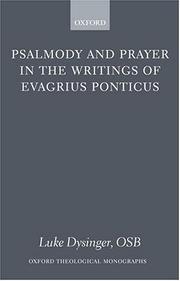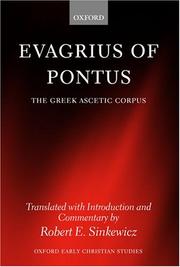| Listing 1 - 10 of 11 | << page >> |
Sort by
|
Book
ISBN: 9780521896801 0521896800 9781139051347 9781107249868 1107249864 1139051342 1139888099 1107241049 1107250692 1107248205 1107247373 1107249031 1299772552 Year: 2013 Publisher: Cambridge: Cambridge university press,
Abstract | Keywords | Export | Availability | Bookmark
 Loading...
Loading...Choose an application
- Reference Manager
- EndNote
- RefWorks (Direct export to RefWorks)
"Evagrius Ponticus is regarded by many scholars as the architect of the eastern heresy Origenism, as his theology corresponded to the debates that erupted in 399 and episodically thereafter, culminating in the Second Council of Constantinople in 553 AD. However some scholars now question this conventional interpretation of Evagrius' place in the Origenist controversies. Augustine Casiday sets out to reconstruct Evagrius' theology in its own terms, freeing interpretation of his work from the reputation for heresy that overwhelmed it, and studying his life, writings and evolving legacy in detail. The first part of this book discusses the transmission of Evagrius' writings, and provides a framework of his life for understanding his writing and theology, whilst part two moves to a synthetic study of major themes that emerge from his writings. This book will be an invaluable addition to scholarship on Christian theology, patristics, heresy and ancient philosophy"
Evagrius, --- 276 =75 EVAGRIUS PONTICUS --- Griekse patrologie--EVAGRIUS PONTICUS --- Euagrios, --- Evagre, --- Evagriĭ, --- Evagrios, --- Evagrius Ponticus, --- Arts and Humanities --- Religion --- Evagrius, - Ponticus, - 345?-399.
Book
ISBN: 9783830675228 3830675224 Year: 2011 Volume: 11 Publisher: Roma: Pontificio ateneo S. Anselmo,
Abstract | Keywords | Export | Availability | Bookmark
 Loading...
Loading...Choose an application
- Reference Manager
- EndNote
- RefWorks (Direct export to RefWorks)
Evagrius, --- Bible --- Criticism, interpretation, etc --- History --- 276 =75 EVAGRIUS PONTICUS --- 276:22 --- Griekse patrologie--EVAGRIUS PONTICUS --- Patrologie en exegese --- Criticism, interpretation, etc. --- 276:22 Patrologie en exegese --- Euagrios, --- Evagre, --- Evagriĭ, --- Evagrios, --- Evagrius Ponticus, --- Biblia --- Evagrius, - Ponticus, - 345?-399
Book
ISBN: 9783923946815 3923946813 Year: 2010 Volume: 27 Publisher: Bonn: Borengässer,
Abstract | Keywords | Export | Availability | Bookmark
 Loading...
Loading...Choose an application
- Reference Manager
- EndNote
- RefWorks (Direct export to RefWorks)
Prayer --- Christianity --- History --- Evagrius, --- 276 =75 EVAGRIUS PONTICUS --- Griekse patrologie--EVAGRIUS PONTICUS --- Nilus, --- Euagrios, --- Evagre, --- Evagriĭ, --- Evagrios, --- Evagrius Ponticus, --- Prayer - Christianity - History - Early church, ca 30-600 --- Evagrius, - Ponticus, - 345?-399 --- Evagrius, - Ponticus, - 345?-399 - De oratione
Book
ISBN: 1317138848 1282295098 9786612295096 0754692876 9780754692874 0754616851 9780754616856 9780754616856 1315581167 Year: 2009 Publisher: Farnham, England Burlington, VT Ashgate
Abstract | Keywords | Export | Availability | Bookmark
 Loading...
Loading...Choose an application
- Reference Manager
- EndNote
- RefWorks (Direct export to RefWorks)
Evagrius of Pontus and Gregory of Nyssa have either been overlooked by philosophers and theologians in modern times, or overshadowed by their prominent friend and brother (respectively), Basil the Great. Yet they are major figures in the development of Christian thoughts in late antiquity and their works express a unique combination of desert and urban spiritualities in the lived and somewhat turbulent experience of an entire age. They provide a significant link between the great ancient thinkers of the past - Plato, Aristotle, the Stoics, Clement and others - and the birth and transmission of
Evagrius, --- Gregory, --- Ghirīghūriyūs, --- Grégoire, --- Gregor, --- Gregori, --- Gregorio, --- Grēgorios, --- Gregorius, --- Grigoli, --- Grigoriĭ, --- Grzegorz, --- Qiddīs Ghirīghūriyūs Usquf Nīṣṣ, --- Grigorije, --- Euagrios, --- Evagre, --- Evagriĭ, --- Evagrios, --- Evagrius Ponticus, --- Gregorius Nyssenus --- Gregor von Nyssa --- Gregorio di Nissa --- Gregorius van Nyssa --- Gregory of Nyssa --- Grégoire de Nysse

ISBN: 0199273200 9780199273201 Year: 2005 Publisher: Oxford: Oxford university press,
Abstract | Keywords | Export | Availability | Bookmark
 Loading...
Loading...Choose an application
- Reference Manager
- EndNote
- RefWorks (Direct export to RefWorks)
Evagrius Ponticus --- Psalmody --- History --- To 1500 --- Prayer --- Christianity --- History of doctrines --- Primitive and early church, ca. 30-600 A.D. --- 276 =75 EVAGRIUS PONTICUS --- Choral singing --- Music --- Worship --- Prayers --- Griekse patrologie--EVAGRIUS PONTICUS --- Religious aspects --- Evagrius, --- Euagrios, --- Evagre, --- Evagriĭ, --- Evagrios, --- Evagrius Ponticus,
Book
ISBN: 9782503594941 2503594948 9782503594958 Year: 2021 Publisher: Turnhout Brepols
Abstract | Keywords | Export | Availability | Bookmark
 Loading...
Loading...Choose an application
- Reference Manager
- EndNote
- RefWorks (Direct export to RefWorks)
This book presents the teaching of Evagrius of Pontus (345-399) about eight passionate thoughts (logismoi), i.e. gluttony, impurity, avarice (greed), sadness, anger (wrath), acedia, vanity and pride. The study first reconstructs cosmology, eschatology, anthropology and spiritual teaching of the monk of Pontus in order to show the nature, dynamics and ways of combating against the eight passionate thoughts as proposed by Evagrius. His teaching in this regard became the basis for later Christian teaching on the Seven Deadly Sins and an inspiration in the future for some currents of modern psychology.
Sin --- Deadly sins --- Theology, Doctrinal --- Christian doctrines --- Christianity --- Doctrinal theology --- Doctrines, Christian --- Dogmatic theology --- Fundamental theology --- Systematic theology --- Theology, Dogmatic --- Theology, Systematic --- Theology --- Capital sins --- Seven capital sins --- Seven deadly sins --- Sins, Capital --- Sins, Deadly --- Sins --- Sin, Mortal --- Theological anthropology --- Transgression (Ethics) --- History of doctrines --- Doctrines --- Evagrius, --- Euagrios, --- Evagre, --- Evagriĭ, --- Evagrios, --- Evagrius Ponticus, --- Euagrios ho Pontikos

ISBN: 0199259933 0191698652 9780191698651 0199297088 9786612365843 0191516368 1282365843 0191531901 9780191531903 9780199297085 9780199259939 Year: 2003 Volume: *7 Publisher: Oxford: Oxford university press,
Abstract | Keywords | Export | Availability | Bookmark
 Loading...
Loading...Choose an application
- Reference Manager
- EndNote
- RefWorks (Direct export to RefWorks)
Evagrius of Pontus (c.345-399) was one of the most prominent and influential figures among the monks of the desert settlements in Lower Egypt. This is a complete English translation of his writings. - ;Evagrius of Pontus (c.345-399) was one of the most prominent figures among the monks of the desert settlements of Nitria, Sketis, and Kellia in Lower Egypt. Through the course of his ascetic writings he formulated a systematic presentation of the teaching of the semi-eremitic monks of these settlements. The works of Evagrius had a profound influence on Eastern Orthodox monastic teaching and pass
Church history --- 276 =75 EVAGRIUS PONTICUS --- -Christianity --- Ecclesiastical history --- History, Church --- History, Ecclesiastical --- History --- Christianity --- Griekse patrologie--EVAGRIUS PONTICUS --- Evagrius Ponticus --- Asceticism --- Evagrius, --- Church history -- Primitive and early church, ca. 30-600 -- Sources. --- Electronic books. -- local. --- Evagrius, -- Ponticus, -- 345?-399 -- Translations into English. --- Religion --- Philosophy & Religion --- -Griekse patrologie--EVAGRIUS PONTICUS --- Evagre le Pontique --- Evagrius van Pontus --- Ewagrîs îḥîdoyô --- Euagrios, --- Evagre, --- Evagriĭ, --- Evagrios, --- Evagrius Ponticus, --- Church history - Primitive and early church, ca. 30-600 - Sources.
Book
ISBN: 9780754662655 9781315581170 9781317138808 9781317138815 9781138278400 0754662659 Year: 2009 Publisher: Farnham: Ashgate,
Abstract | Keywords | Export | Availability | Bookmark
 Loading...
Loading...Choose an application
- Reference Manager
- EndNote
- RefWorks (Direct export to RefWorks)
Spiritual life --- Gnosticism --- Vie spirituelle --- Gnosticisme --- History of doctrines --- History --- Histoire des doctrines --- Histoire --- Evagrius, --- -276 =75 EVAGRIUS PONTICUS --- 273.1 --- Life, Spiritual --- Religious life --- Spirituality --- -Griekse patrologie--EVAGRIUS PONTICUS --- Gnosis. Gnosticisme --- Euagrios, --- Evagre, --- Evagriĭ, --- Evagrios, --- Evagrius Ponticus, --- 273.1 Gnosis. Gnosticisme --- Evagrius Ponticus --- 276 =75 EVAGRIUS PONTICUS --- Griekse patrologie--EVAGRIUS PONTICUS --- Spiritual life - History of doctrines - Early church, ca. 30-600. --- Evagrius, - Ponticus, - 345?-399.
Book
ISBN: 9780754616856 0754616851 9781315581163 9781317138839 9781317138846 Year: 2009 Volume: *1 Publisher: Farnham: Ashgate,
Abstract | Keywords | Export | Availability | Bookmark
 Loading...
Loading...Choose an application
- Reference Manager
- EndNote
- RefWorks (Direct export to RefWorks)
Evagrius of Pontus and Gregory of Nyssa have either been overlooked by philosophers and theologians in modern times, or overshadowed by their prominent friend and brother (respectively), Gregory Nazianzus and Basil the Great. Yet they are major figures in the development of Christian thought in late antiquity and their works express a unique combination of desert and urban spiritualities in the lived and somewhat turbulent experience of an entire age. They also provide a significant link between the great ancient thinkers of the past - Plato, Aristotle, the Stoics, Clement and others - and the birth and transmission of the early Medieval period - associated with Boethius, Cassian and Augustine. This book makes accessible, to a wide audience, the thought of Evagrius and Gregory on the mind, soul and body, in the context of ancient philosophy/theology and the Cappadocians generally. Corrigan argues that in these two figures we witness the birth of new forms of thought and science. Evagrius and Gregory are no mere receivers of a monolithic pagan and Christian tradition, but innovative, critical interpreters of the range and limits of cognitive psychology, the soul-body relation, reflexive self-knowledge, personal and human identity and the soul's practical relation to goodness in the context of human experience and divine self-disclosure. This book provides a critical evaluation of their thought on these major issues and argues that in Evagrius and Gregory we see the important integration of many different concerns that later Christian thought was not always able to balance including: mysticism, asceticism, cognitive science, philosophy, and theology.
Soul --- Christianity --- History of doctrines --- Evagrius Ponticus, --- Gregorius Nyssenus, --- Evagrius, --- Gregory, --- Ghirīghūriyūs, --- Grégoire, --- Gregor, --- Gregori, --- Gregorio, --- Grēgorios, --- Gregorius, --- Grigoli, --- Grigoriĭ, --- Grzegorz, --- Qiddīs Ghirīghūriyūs Usquf Nīṣṣ, --- Euagrios, --- Evagre, --- Evagriĭ, --- Evagrios, --- Grigorije, --- Gregorius Nyssenus --- Gregor von Nyssa --- Gregorio di Nissa --- Gregorius van Nyssa --- Gregory of Nyssa --- Grégoire de Nysse --- Soul - History of doctrines --- Evagrius Ponticus, - 346-399 --- Gregorius Nyssenus, - saint, - ca 335-ca 394
Book
ISBN: 3790214108 9783790214109 Year: 1986 Volume: 24 Publisher: Trier: Paulinus,
Abstract | Keywords | Export | Availability | Bookmark
 Loading...
Loading...Choose an application
- Reference Manager
- EndNote
- RefWorks (Direct export to RefWorks)
Asceticism --- Spiritual life --- Monks --- Early works to 1800 --- Christianity --- Correspondence --- Evagrius, --- -Monks --- -Spiritual life --- -Life, Spiritual --- Religious life --- Spirituality --- Christians --- Monasticism and religious orders --- Ascetical theology --- Contempt of the world --- Theology, Ascetical --- Christian life --- Ethics --- -Early works to 1800 --- Evagrius Ponticus --- -Correspondence --- -Evagre le Pontique --- Evagrius van Pontus --- Ewagrîs îḥîdoyô --- Life, Spiritual --- Christianity&delete& --- Euagrios, --- Evagre, --- Evagriĭ, --- Evagrios, --- Evagrius Ponticus, --- Correspondence. --- Asceticism - Early works to 1800 --- Spiritual life - Christianity - Early works to 1800 --- Monks - Egypt - Correspondence --- Evagrius, - Ponticus, - 345?-399 - Correspondence --- Evagrius, - Ponticus, - 345?-399
| Listing 1 - 10 of 11 | << page >> |
Sort by
|

 Search
Search Feedback
Feedback About UniCat
About UniCat  Help
Help News
News